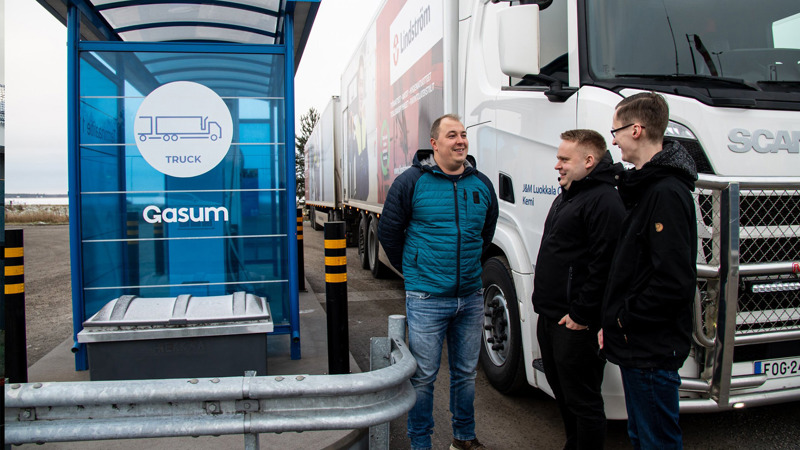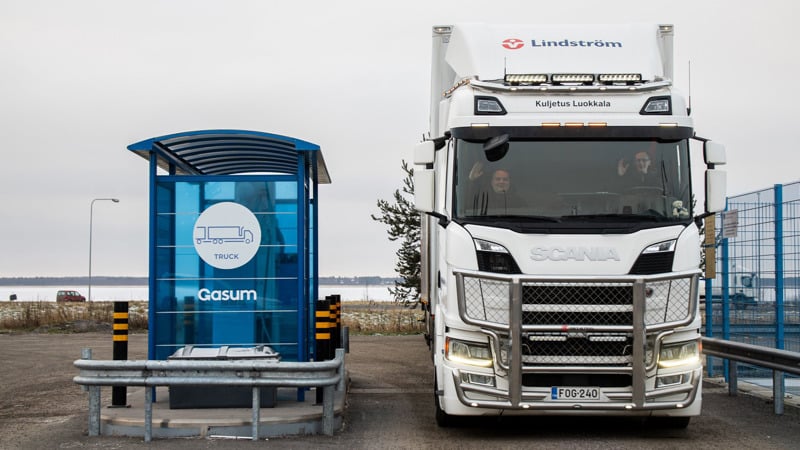Liquefied biogas is a sustainable and safe fuel choice for heavy winter traffic
Liquefied biogas (LBG) is a safe and environmentally friendly fuel alternative for heavy traffic, even in winter. The use of biogas does not have frost limits like diesel, and the level of biogas consumption does not increase even in severe frost. In cold winter weather, the use of biogas is relatively cheaper than diesel.
Many transport and logistics companies have changed their heavy road traffic fuel from diesel to more environmentally friendly biogas, which maintains its power and reliability even in severely cold weather. Vehicles can be filled with either liquefied biogas (LBG) or liquefied natural gas (LNG), but almost all Gasum's customers refuel exclusively with biogas. All biogas produced by Gasum in the Nordics is renewable local energy.
Liquefied biogas is environmentally more friendly fuel for heavy traffic than diesel. Biogas-powered heavy traffic produces on average 90% fewer greenhouse gas emissions than diesel-powered heavy traffic.
The northern transport company runs on biogas
Matti Luokkala Oy, a transport company operating in northern Finland, introduced its first combination of LNG vehicles for regular transport in early 2020. At the beginning of 2022, the company changed its fuel to the even lower-emission renewable LBG.
From the beginning, Gasum has worked as Luokkala's partner in gas delivery. The company is constantly exploring opportunities to expand the gas station network in Finland and elsewhere in the Nordic countries, so that traffic can be made cleaner and more carbon neutral.

CEO Juha Luokkala's experiences on cooperation with Gasum and driving on gas have been very good.
"Reducing emissions was the key reason for our decision, but we also wanted to test how gas works as a fuel in northern conditions. We started two and a half years ago with one LNG-powered hybrid vehicle. The experiences have been good and today we use LBG, which is the greenest solution of all," says Luokkala.
"When driving on gas, freezing of the fuel is not a problem. Moreover, the engine reaches normal operating temperature significantly faster with gas compared to diesel. The engine is also really quiet and consumption is really low under normal conditions," Juha Luokkala says about the good feedback he has received from drivers.
Persistent biogas myths are being busted
Winters in Nordics bring repeated challenges to transport and logistics companies. Weather conditions are not always predictable, and the temperature can vary by tens of degrees in a short time. Diesel can become cloudy in severe frost, but the use of liquefied gas has no frost limits.
However, according to Jani Arala, Gasum’s Head of Sustainable Logistics Solutions, there are still certain myths associated with the use of gas in winter conditions.
"Many may think that since liquefied gases such as butane and propane do not vaporize at cold enough temperatures, liquefied gas would not vaporize in severe frosts either, and therefore would not be able to get out of the tank in gaseous form. However, this is not a problem with liquefied biogas and natural gas, as the vaporization point of gas in liquid form is around -162 degrees," says Jani Arala.

According to Juha Luokkala, CEO of the transport company Luokkala, refueling gas-powered cars also goes smoothly.
"There are no problems with refueling. Cleanliness must be remembered, and snow and slush must be removed from the connectors during the winter. Protective equipment must also be remembered when refueling. However, it's not a disadvantage, if you add a minute more time to refueling, you'll get used to it," says Juha Luokkala.
Gas consumption does not increase significantly in winter
During the winter, the use of gas is also relatively cheaper than diesel. This is because gas consumption remains almost the same regardless of temperature and weather.
"In the case of biogas or natural gas, there is no change in consumption due to a change in the condition of the fuel, like diesel. Gas consumption in winter is only affected by a small increase in rolling resistance. It means that gas consumption increases significantly less in winter conditions than diesel consumption," says Jani Arala.
"Furthermore, the energy content of fossil diesel used in winter is lower than summer quality. Manufacturing winter quality is also more expensive, which is reflected in the fuel costs of diesel-powered vehicles during the winter. There is no difference when using gas," Arala continues.
Juha Luokkala has also noticed the difference in costs.
"The consumption is lower when driving on gas compared to diesel, and the price is therefore a bit cheaper. With clearly lower consumption, gas has been used more than diesel ", states Juha Luokkala.
Transport company Luokkala could also invest in new gas-powered vehicles.
"We have been satisfied with the functionality of gas as a fuel. More gas cars could be installed, especially if the refueling network could be made even wider," says Juha Luokkala.
Is your business seeking a way to a cleaner future?
Contact us and we'll tell you more about the possibilities in gas logistics.


